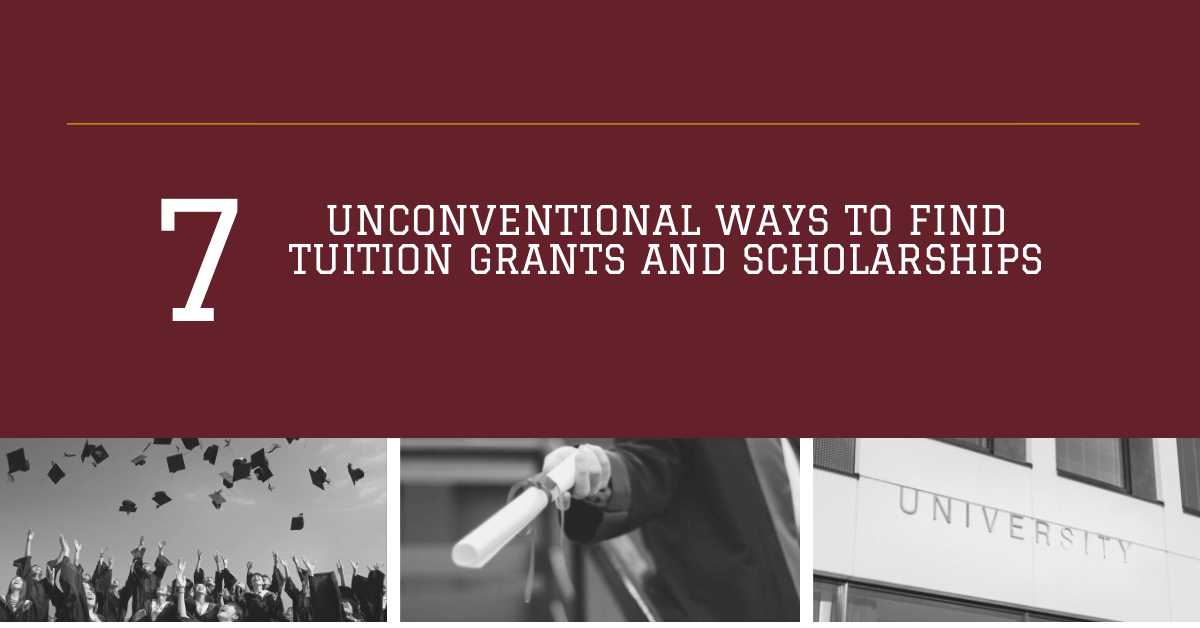7 Unconventional Ways to Find Tuition Grants and Scholarships
 Going to university allows students to dream big and achieve whatever goals they set, but funding keeps people from submitting applications. Universities are expensive and require years of maintaining the same financial capabilities to keep up with rising tuition costs.
Going to university allows students to dream big and achieve whatever goals they set, but funding keeps people from submitting applications. Universities are expensive and require years of maintaining the same financial capabilities to keep up with rising tuition costs.
If you’re wondering where to find scholarships and grants, check out this complete guide to unconventional funding for university so you can study whatever you want in school.
1. Check Your Desired Program
Many university programs offer scholarships for current and future students. If you already know what you want to study, check the relevant programs at potential universities. People who want to become doctors or lawyers could connect with program administrators and find resources available for applicants. Make an appointment or visit their website to learn more about what you’ll need to submit for consideration.
2. Talk With Your Boss
If you already have a job with a large company, they may provide education assistance because you’re an employee.
Talk with your boss or supervisor about potential funding opportunities. They could point out unique grants and scholarships for university, like how Walmart Canada launched a tuition reimbursement program for employees who signed up for classes at participating campuses. Whether you want to study online or in-person, you’ll find the financial help you need to achieve your future degree.
3. Look for Regional Funding
Where you live could help you go back to school. Region-based grants are another form of unconventional funding for university because they can come from many different sources. In the U.S., Virginia residents can find assistance through the Virginia Lottery and get grants not available to people from other states. Research your province or territory to see if there’s any funding available for residents in your area through similar programs.
4. Connect With Charities
Some charities go out of their way to provide comprehensive funding for traditional and non-traditional students. The Schulich Leader Scholarships Group gives away $180,000 every year to students in Engineering or STEM fields. In 2021, it awarded $100,000 to an engineering student to cover her school fees so she could focus on her studies and research projects. Depending on what you want to study, you could be eligible for similar scholarships.
5. Search Around Online
People also find unique grants and scholarships for university by looking around online for reviews. Current and former students may post about their experience with finding and applying for grants. Read about how much help they received and how easy it was to access to narrow down your options. You may save yourself time and pinpoint better resources because of negative reviews.
6. Call Your Union Representative
Anyone wondering where to find scholarships and grants can call their union representative if they’re part of a union. Along with many other benefits, union members may also qualify for tuition assistance. Reach out to your representative to find out if that’s possible. It may be an easier and faster way to get a scholarship because you won’t have to compete with outside applicants.
7. Get Involved With Extracurriculars
Secondary school students may want to get involved with extracurricular activities. It makes you a more impressive applicant for university review boards, but the groups may also provide grants or scholarships. Organizations like Scouts Canada or the Boys & Girls Clubs of Canada allow members to apply for funding. See if you’re eligible to join and what the requirements are before submitting your scholarship applications.
Find Tuition Grants and Scholarships
There are many ways to find unconventional funding for university, but these are the best places to start. Consider where you work, if you’re part of any organization, and what you want to study to find helpful resources that could solve any financial complications keeping you from your preferred university.
About the Author
 Ginger Abbot is a freelance writer and the Editor-in-Chief of Classrooms, an online learning magazine for students, graduates and educators.
Ginger Abbot is a freelance writer and the Editor-in-Chief of Classrooms, an online learning magazine for students, graduates and educators.

